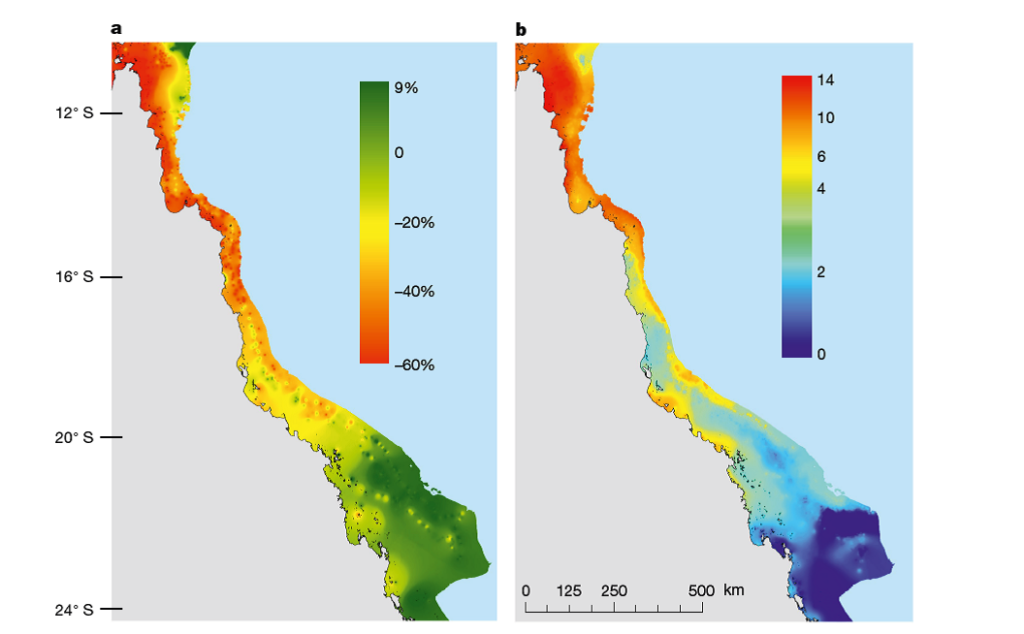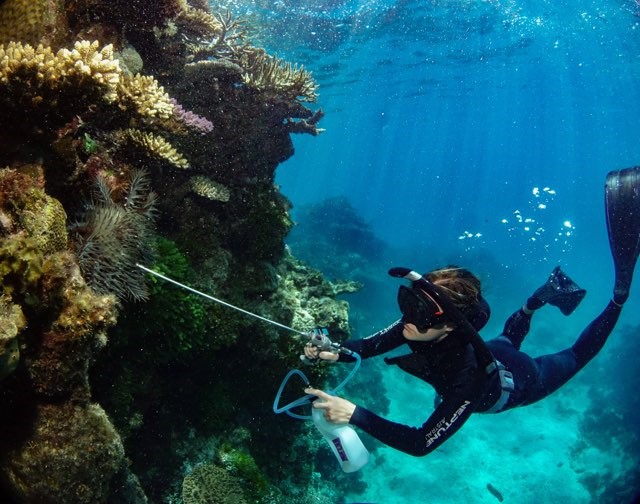Author: Jennifer McWhorter
Jennifer McWhorter is pursuing her PhD in a joint program between the Universities of Exeter and Queensland. Using various climate and ecological modelling techniques, Jen hopes to improve our spatial knowledge of coral reef stressors.

Similar to humans experiencing a fever, coral reefs undergo similar stress. The more frequent the fever and the longer the fever lasts, the more life threatening it becomes. Sea surface temperatures in the ocean are increasing at an alarming rate due to human inputs of carbon dioxide into the atmosphere (Ekwurzel et al., 2017). In 2016/2017, the Great Barrier Reef (GBR) experienced two back-to-back severe warming events that caused widespread coral bleaching[1]. According to the Australia Institute of Marine Science, hard coral cover on the GBR has declined at a rate that has never been recorded.

In addition to coral bleaching, cyclones and crown-of-thorns sea star outbreaks have been the main cause of decline in coral cover on the GBR within the past four years. The northern area of the GBR is expected to have lost about half of its’ coral cover. This estimate reflects the impacts of two episodes of severe coral bleaching from 2014-2017 and two cyclones. The central reef has experienced a decline in coral cover from 22% in 2016 to 14% in 2018 due to coral bleaching and the ongoing southward spread of the crown-of-thorns sea star. Even though the southern portion of the GBR was not exposed to the 2016/2017 warming events, coral cover has dropped from 33% in 2017 to 25% in 2018. On the southern reefs, the crown-of-thorns sea star outbreaks appear to be the main cause for the most recent decline.

“Clearly the reef is struggling with multiple impacts,” says Prof. Terry Hughes, Director of the ARC Centre of Excellence for Coral Reef Studies. “Without a doubt the most pressing of these is global warming. As temperatures continue to rise the corals will experience more and more of these events: 1°C of warming so far has already caused four events in the past 19 years.”
“Ultimately, we need to cut carbon emissions, and the window to do so is rapidly closing.”
—
[1] Coral bleaching – Coral bleaching occurs when the relationship between the coral host and zooxanthellae (photosynthetic algae, NOAA), which give coral much of their colour, breaks down. Without the zooxanthellae, the tissue of the coral animal appears transparent and the coral’s bright white skeleton is revealed. Corals begin to starve once they bleach. (GBRMPA)
Additional Resources:
Ekwurzel, B., Boneham, J., Dalton, M. W., Heede, R., Mera, R. J., Allen, M. R., & Frumhoff, P. C. (2017). The rise in global atmospheric CO2, surface temperature, and sea level from emissions traced to major carbon producers. Climatic Change, 144(4), 579-590.
Hughes, T.P. & Kerry, J.T. Back-to-back bleaching has now hit two-thirds of the Great Barrier Reef. The Conversation https://theconversation.com/back-to-back-bleaching-has-now-hit-two-thirds-of-the-great-barrier-reef-76092 (2017)
Hughes, T. P., Kerry, J. T., Baird, A. H., Connolly, S. R., Dietzel, A., Eakin, C. M., … & McWilliam, M. J. (2018). Global warming transforms coral reef assemblages. Nature, 556(7702), 492.
Media Release: Two Thirds of the Great Barrier Reef hit by back-to-back mass coral bleaching
Long-term Reef Monitoring Program – Annual Summary Report on coral reef condition for 2017/2018
#ExeterMarine is an interdisciplinary group of marine related researchers with capabilities across the scientific, medical, engineering, humanities and social science fields. If you are interested in working with our researchers or students, contact Michael Hanley or visit our website!
